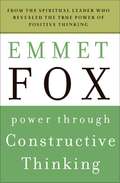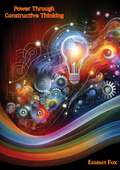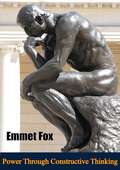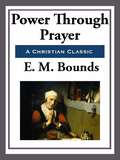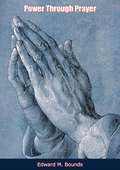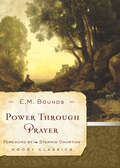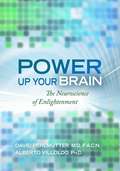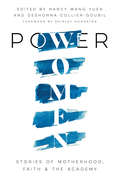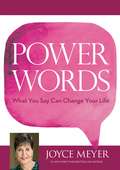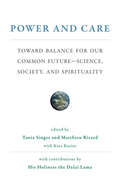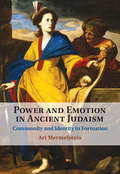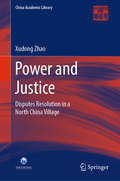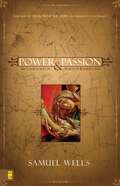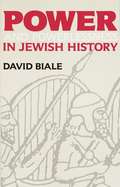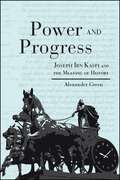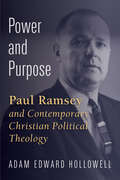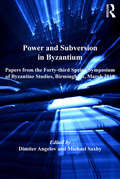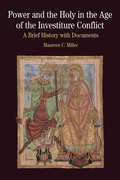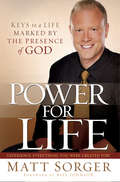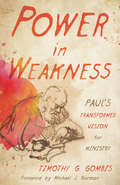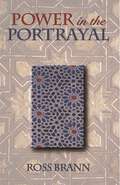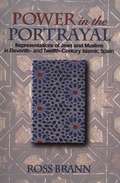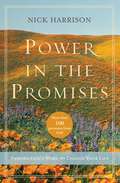- Table View
- List View
Power Through Constructive Thinking
by Emmet FoxOne of the First Books to Demonstrate the Power of Positive Thoughts Fresh with contemporary relevance, this classic of positive thinking from one of the world's greatest motivational writers offers stirring insights on self-transformation. Based on Emmet Fox's simple message that "thoughts are things" and all potential rests in their creative and constructive use, these thirty-one inspiring essays show how to have it all--health, success, happiness, and a liberated spirit--through the power of constructive thought. First published in 1940, Power Through Constructive Thinking has been a never-failing source of strength and renewal for generations of readers.
Power Through Constructive Thinking
by Emmet FoxOne of the First Books to Demonstrate the Power of Positive ThoughtsFresh with contemporary relevance, this classic of positive thinking from one of the world's greatest motivational writers offers stirring insights on self-transformation. Based on Emmet Fox's simple message that "thoughts are things" and all potential rests in their creative and constructive use, these thirty-one inspiring essays show how to have it all--health, success, happiness, and a liberated spirit--through the power of constructive thought. First published in 1940, Power Through Constructive Thinking has been a never-failing source of strength and renewal for generations of readers.
Power Through Constructive Thinking
by Emmet FoxUnlock the transformative power of positive thinking with Emmet Fox’s timeless classic, Power Through Constructive Thinking. This influential work by one of the 20th century’s most renowned spiritual teachers offers profound insights and practical guidance on harnessing the power of your mind to create a more fulfilling and successful life.Emmet Fox, a pioneer in the field of metaphysical thought, presents a series of inspiring essays and lessons that teach readers how to tap into their inner potential and overcome life’s challenges. His teachings are grounded in the belief that our thoughts shape our reality, and by changing the way we think, we can change our lives for the better.Power Through Constructive Thinking covers a wide range of topics, from overcoming fear and anxiety to developing self-confidence and achieving personal goals. Fox’s clear and engaging writing style makes complex spiritual and psychological concepts accessible to readers of all backgrounds. Each chapter is filled with practical advice, real-life examples, and powerful affirmations that can be applied to everyday situations.Central to Fox’s philosophy is the idea that constructive thinking leads to constructive living. He emphasizes the importance of maintaining a positive mindset, focusing on solutions rather than problems, and cultivating an attitude of gratitude and optimism. His teachings encourage readers to see the divine potential within themselves and to use this awareness to manifest abundance, health, and happiness.Power Through Constructive Thinking is more than just a self-help book; it is a spiritual guide that empowers readers to take control of their thoughts and, consequently, their destinies. Fox’s wisdom and insights have inspired millions and continue to resonate with those seeking to improve their lives through the power of positive thinking.
Power Through Constructive Thinking (Plus Ser.)
by Emmet FoxOriginally published in 1932 by the renowned New Thought spiritual leader Emmet Fox, this book is intended to teach the principles of life-building through constructive thought.“All power lies is creative thought. Thought is the key to life; for as a man thinketh in his heart, so is he. People are beginning to understand today something of the power of thought to shape the individual’s destiny—they know vaguely that thoughts are things—but how the Great Law of thought is to be applied they do not know.“This book shows that your destiny is really in your own hands, because it is impossible to think one thing and produce another, and that by the selection of correct thought a harmonious and happy life is produced. It shows that weak and fickle thinking produces a drifting and wasted life, and that positive thinking produces success and happiness. It shows that fear is the ultimate cause of Tap-Root of all sickness, failure, and disappointment. And it shows the only possible method of overcoming fear.”
Power Through Prayer
by E. M. BoundsPower Through Prayer teaches readers that prayer is much more than just another thing to cross off their lists each day. This guidebook provides believers with information about the most effective ways to use prayer to better understand God s word, fully appreciate divine power, and more deeply commune with God. Power Through Prayer has the potential to transform a static but faithful Christian life into one that is dynamic, ever-changing, and always learning.
Power Through Prayer (Lumen Classics Ser.)
by Edward M. BoundsPower Through Prayer is one of EM Bounds many classic works on prayer. He is practical yet spiritual, challenging us to seek God in passionate and unrelenting prayer.Christ did not come for the righteous but for the sinner and He calls us to pray like he did to the Father in a continual basis. Bounds in this work outlines what kind of heaven and earth shattering effects prayer can have from the individual person to the very ministry that someone may be trying to perform. There is no limit or bounds to what kind of power to faith prayer can have.
Power Through Prayer: Discover The Importance Of Communing With God (Moody Classics)
by E. M. BoundsPastor and civil war chaplain E. M. Bounds penned his slim classic on prayer for the simple reason that Christians don't pray enough. "The little estimate we put on prayer is evident from the little time we give to it," he wrote. "Talking to men for God is a great thing, but talking to God for men is greater still."Bounds' simple, concise volume can help all Christians rediscover the source of spiritual power in their life.
Power Up Your Brain: The Neuroscience of Enlightenment
by David Perlmutter Alberto VilloldoWith nutritional advice, dietary supplements, physical exercise, shamanic practices, meditation, and visualizations, Perlmutter and Villoldo guide readers, step by step, through a program to help them clear their minds from previous trauma and open themselves up to experience the inner peace, vast insight, and extraordinary creativity that define the experience of enlightenment, paving the way to successfully face the challenges to come.
Power Women: Stories of Motherhood, Faith, and the Academy
by Nancy Wang Yuen Deshonna Collier-Goubil, Nancy Wang Yuen Deshonna Collier-Goubilhow parenting and teaching can be mutually enrichingmanaging ambition, identity, and timeaddressing misconceptions about motherhood in the academy, church, and societynavigating gender roles in marriagetaking maternity leaveflourishing as an adjunct professormentoring professor momsresisting imposter syndrome by finding rest in God
Power Words: What You Say Can Change Your Life
by Joyce MeyerJoyce Meyer, # 1 New York Times bestselling author, helps readers tap into the life-changing power of positive words and prayer to overcome everyday problems in POWER WORDS. Developing the habit of speaking God's Word will unlock the power of transformation in readers' lives. In this compact derivative of her bestselling book, Me and My Big Mouth, Joyce Meyer draws from personal experience and Scripture to illustrate how prayer and positive words can be used to overcome every challenge that stands in the way of fulfillment. Joyce teaches readers how to to stop talking idly about their problems and use God's POWER WORDS to defeat them.
Power and Care: Toward Balance for Our Common Future#Science, Society, and Spirituality (The\mit Press Ser.)
by Matthieu Ricard Tania Singer Kate KariusLeading thinkers from a range of disciplines discuss the compatibility of power and care, in conversation with the Dalai Lama.For more than thirty years, the Dalai Lama has been in dialogue with thinkers from a range of disciplines, helping to support pathways for knowledge to increase human wellbeing and compassion. These conversations, which began as private meetings, are now part of the Mind & Life Institute and Mind & Life Europe. This book documents a recent Mind & Life Institute dialogue with the Dalai Lama and others on two fundamental forces: power and care—power over and care for others in human societies.The notion of power is essentially neutral; power can be used to benefit others or to harm them, to build or to destroy. Care, on the other hand, is not a neutral force; it aims at increasing the wellbeing of others. Power and care are not incompatible: power, imbued with care, can achieve more than a powerless motivation to care; power, without the intention to benefit others, can be ruthless. The contributors—who include such celebrated figures as Frans B. M. de Waal, Olafur Eliasson, Sarah Blaffer Hrdy, and Jody Williams—discuss topics including the interaction of power and care among our closest relatives, the chimpanzees; the effect of meditation and mental training practices on the brain; the role of religion in promoting peace and compassion; and the new field of Caring Economics.ContributorsPaul Collier, Brother Thierry-Marie Courau, Frans B. M. de Waal, Olafur Eliasson, Scilla Elworthy, Alexandra M. Freund, Tenzin Gyatso (His Holiness the Dalai Lama), Markus Heinrichs, Sarah Blaffer Hrdy, Frédéric Laloux, Alaa Murabit, Matthieu Ricard, Johan Rockström, Richard Schwartz, Tania Singer, Dennis J. Snower, Rabbi Awraham Soetendorp, Theo Sowa, Pauline Tangiora, Jody Williams
Power and Emotion in Ancient Judaism: Community and Identity in Formation
by Ari MermelsteinIn this book, Ari Mermelstein examines the mutually-reinforcing relationship between power and emotion in ancient Judaism. Ancient Jewish writers in both Palestine and the diaspora contended that Jewish identity entails not simply allegiance to God and performance of the commandments but also the acquisition of specific emotional norms. These rules regarding feeling were both shaped by and responses to networks of power - God, the foreign empire, and other groups of Jews - which threatened Jews' sense of agency. According to these writers, emotional communities that felt Jewish would succeed in neutralizing the power wielded over them by others and, depending on the circumstances, restore their power to acculturate, maintain their Jewish identity, and achieve redemption. An important contribution to the history of emotions, this book argues that power relations are the basis for historical changes in emotion discourse.
Power and Justice: Disputes Resolution in a North China Village (China Academic Library)
by Xudong ZhaoThis book discusses the relationship, interaction and conflict between everyday life and various institutions in a specific village in North China, with a focus on the formal and informal legal systems. It vividly describes the village’s “legal construction problems” as well as the customs and laws, and such it can be seen as a historical and innovative comment on China’s problems. The book is based on the author’s field investigations assessing vast amounts of material concerning local organizations, formal and informal authorities, economic exchange, religious rituals, as well as interviews with villagers and numerous court files. It presents an in-depth exploration of “pluralism of authority” in China’s rural society, and examines how various authorities were formed. It also summarizes how various local disputes are resolved and discusses the villagers’ understanding of the concept of “justice.” Lastly, it suggests ways in which national law and local customs could communicate and collaborate.
Power and Passion: Six Characters in Search of Resurrection
by Samuel WellsSamuel Wells vividly paints the stories surrounding Jesus’ cross and resurrection. We see the weakness of Pontius Pilate and Barabbas, and the compromised character of Joseph of Arimathea and Nicodemus. We discover the subtle power of Pilate’s wife. And in Peter and Mary Magdalene we find the true power of resurrection, bringing forgiveness and ending the stranglehold of death, thus transforming all human passion. Through close readings of the gospel texts, Wells demonstrates the significance of these characters for faith and life today. In this book, structured with one chapter for each week of Lent, Wells guides us from the deathly power that put Jesus on the cross to the new power brought by Jesus’ resurrection. The book offers opportunities at the end of each chapter for prayer and discussion. The Archbishop of Canterbury has selected Power and Passion as his Lent book for 2007.
Power and Powerlessness in Jewish History
by David BialeTo shed light on the tensions he observed between Jewish perceptions of power versus political realities which "are often the cause of misguided political decisions," like Israel's Lebanese War Biale analyzes Jewish history from the point of view of politics and power. The author of Gershom Scholem: Kabbalah and Counter-History here challenges the conventions of what he terms the Jewish "mythical past": the anachronistic interpretation that the Diaspora, which occurred between the fall of an independent Jewish commonwealth in A.D. 70 and the rebirth of the State of Israel in 1948, was politically impotent, and, conversely, that the First and Second Temple periods were eras of full Jewish national sovereignty.
Power and Progress: Joseph Ibn Kaspi and the Meaning of History
by Alexander GreenThe philosopher and biblical commentator Joseph Ibn Kaspi (1280–1345) was a provocative Jewish thinker of the medieval era whose works have generally been overlooked by modern scholars. Power and Progress by Alexander Green is the first book in English to focus on a central aspect of his work: Ibn Kaspi's philosophy of history. Green argues that Ibn Kaspi understood history as guided by two distinct but interdependent forces: power and progress, both of which he saw manifest in the biblical narrative. Ibn Kaspi discerned that the use of power to shape history is predominantly seen in the political competition between kingdoms. Yet he also believed that there is historical progress in the continuous development and dissemination of knowledge over time. This he derived from the biblical vision of the divine chariot and its varied descriptions across different biblical texts, each revealing more details of a complex, multifaceted picture. Although these two concepts of what drives history are separate, they are also reliant upon one another. National survival is dependent on the progress of knowledge of the order of nature, and the progress of knowledge is reliant on national success. In this way, Green reveals Ibn Kaspi to be more than a mere commentator on texts, but a highly innovative thinker whose insights into the subtleties of the Bible produced a view of history that is both groundbreaking and original.
Power and Purpose: Paul Ramsey and Contemporary Christian Political Theology
by Adam Edward HollowellNot long ago, Paul Ramsey (1913-1988) was a leading voice in North American Christian ethics. Today, however, his intellectual legacy is in question, and his work is largely ignored by current scholars in the field. Against the tide of that neglect, Adam Edward Hollowell argues in Power and Purpose that Ramsey's work can still yield considerable insight for contemporary Christian political theology.Hollowell shows the influences of Jean-Jacques Rousseau and Karl Barth on Ramsey's early work; discusses his conversations with political theologians of his generation, including Reinhold and Richard Niebuhr and Joseph Fletcher; considers his influence on the early virtue theory of Jean Porter and Oliver O'Donovan; and places Ramsey's work in conversation with more recent voices in Christian ethics, including John Bowlin, Jennifer Herdt, Charles Mathewes, Eric Gregory, and Daniel Bell. Hollowell thus forges new connections between Ramsey and contemporary debates in political theology on such issues as political authority, power, just war, and torture.Hollowell's Power and Purpose also revisits well-known aspects of Ramsey's work -- for example, his insistence on the political significance of God's covenant with creation -- and offers an original account of the role of judgment in his theology of repentance. The book dedicates considerable attention to Ramsey's description of practical reasoning and highlights his commitment to the virtues, especially prudence. This accessible introduction to Paul Ramsey will appeal to a wide swath of scholars and students in Christian ethics and political theology.
Power and Religion in Merovingian Gaul
by Yaniv FoxThis study is the first to attempt a thorough investigation of the activities of the Columbanian congregation, which played a significant role in the development of Western monasticism. This was a new form of rural monasticism, which suited the needs and aspirations of a Christian elite eager to express its power and prestige in religious terms. Contrary to earlier studies, which viewed Columbanus and his disciples primarily as religious innovators, this book focuses on the political, economic, and familial implications of monastic patronage and on the benefits elite patrons stood to reap. While founding families were in a privileged position to court royal favour, monastic patronage also exposed them to violent reprisals from competing factions. Columbanian monasteries were not serene havens of contemplation, but rather active foci of power and wealth, and quickly became integral elements of early medieval statecraft.
Power and Subversion in Byzantium: Papers from the 43rd Spring Symposium of Byzantine Studies, Birmingham, March 2010 (Publications of the Society for the Promotion of Byzantine Studies #17)
by Dimiter Angelov Michael SaxbyThis volume addresses a theme of special significance for Byzantine studies. Byzantium has traditionally been deemed a civilisation which deferred to authority and set special store by orthodoxy, canon and proper order. Since 1982 when the distinguished Russian Byzantinist Alexander Kazhdan wrote that 'the history of Byzantine intellectual opposition has yet to be written', scholars have increasingly highlighted cases of subversion of 'correct practice' and 'correct belief' in Byzantium. This innovative scholarly effort has produced important results, although it has been hampered by the lack of dialogue across the disciplines of Byzantine studies. The 43rd Spring Symposium of Byzantine Studies in 2010 drew together historians, art historians, and scholars of literature, religion and philosophy, who discussed shared and discipline-specific approaches to the theme of subversion. The present volume presents a selection of the papers delivered at the symposium enriched with specially commissioned contributions. Most papers deal with the period after the eleventh century, although early Byzantium is not ignored. Theoretical questions about the nature, articulation and limits of subversion are addressed within the frameworks of individual disciplines and in a larger context. The volume comes at a timely junction in the development of Byzantine studies, as interest in subversion and nonconformity in general has been rising steadily in the field.
Power and the Holy in the Age of the Investiture Conflict: A Brief History With Documents
by Maureen C. MillerHistorians tracing the emerging division between church and state in the West have long recognized the importance of the eleventh-century Gregorian reform movement and the investiture conflict — events that reached a dramatic climax in Pope Gregory VII’s excommunication of Emperor Henry IV. In her introduction to this ground-breaking volume, Miller recasts the narrative of reform and the investiture conflict — traditionally portrayed as an elitist struggle between church and state — in terms of a broad shift in conceptions of the nature of power and the holy. The volume brings together a wide selection of compelling documents — many of which have been largely unavailable — that allows students to place the investiture conflict within the wider context of social and political change in medieval Europe. Document headnotes, a chronology, a selected bibliography, and questions for consideration provide further pedagogical support.
Power for Life: Keys to a Life Marked by the Presence of God
by Matt SorgerRelease God’s Greatness Within You In a world where darkness is in a continual clash with light, people are in desperate need of something or someone to believe in--leaders, friends, and pastors with integrity and truth. Is it you? Power for Life gives you the keys to experiencing this extraordinary life--one that is marked by the presence and power of God. Each chapter covers an essential principle that will enable you to... Overcome issues from your past Develop fresh vision for your future Continually walk in victory
Power in Weakness: Paul's Transformed Vision for Ministry
by Timothy G. GombisEnvisioning cruciform community built on resurrection hope After Paul&’s encounter with the risen Christ on the road to Damascus, he turned from coercion and violence to a ministry centered on the hope of Christ&’s resurrection. In earthly terms, Paul had traded power for weakness. But—as he explained in his subsequent letters—this &“weakness&” was actually the key to flourishing community that is able to experience God&’s transformation, restoration, and healing. What would it mean for pastors today to take seriously Paul&’s exhortation in 1 Corinthians 11:1 to &“imitate me as I imitate Christ&” and lead their congregations in this way? Instead of drawing leadership principles and practices from the worlds of business, education, and politics—which tend to orient churches around institutional power and image maintenance—Timothy Gombis follows Paul in resisting the influence of the &“present evil age&” by making cruciformity the operating principle of the church. Gombis guides the reader through practices and patterns that can lead a congregation past a focus on individual salvation, toward becoming instead a site of resurrection power on earth.
Power in the Portrayal: Representations of Jews and Muslims in Eleventh- and Twelfth-Century Islamic Spain (Jews, Christians, and Muslims from the Ancient to the Modern World #39)
by Ross BrannPower in the Portrayal unveils a fresh and vital perspective on power relations in eleventh- and twelfth-century Muslim Spain as reflected in historical and literary texts of the period. Employing the methods of the new historical literary study in looking at a range of texts, Ross Brann reveals the paradoxical relations between the Andalusi Muslim and Jewish elites in an era when long periods of tolerance and respect were punctuated by outbreaks of tension and hostility. The examined Arabic texts reveal a fragmented perception of the Jew in eleventh-century al-Andalus. They depict seemingly contradictory figures at whose poles are an intelligent, skilled, and noble Jew deserving of homage and a vile, stupid, and fiendish enemy of God and Islam. For their part, the Hebrew and Judeo-Arabic texts display a deep-seated reluctance to portray Muslims in any light at all. Brann cogently demonstrates that these representations of Jews and Muslims--each of which is concerned with issues of sovereignty and the exercise of power--reflect the shifting, fluctuating, and ambivalent relations between elite members of two of the ethno-religious communities of al-Andalus. Brann's accessible prose is enriched by his splendid translations; the original texts are also included. This book is the first to study the construction of social meaning in Andalusi Arabic, Judeo-Arabic, and Hebrew literary texts and historical chronicles. The novel approach illuminates nuances of respect, disinterest, contempt, and hatred reflected in the relationship between Muslims and Jews in medieval Spain.
Power in the Portrayal: Representations of Jews and Muslims in Eleventh- and Twelfth-century Islamic Spain
by Ross BrannPower in the Portrayal unveils a fresh and vital perspective on power relations in eleventh- and twelfth-century Muslim Spain as reflected in historical and literary texts of the period. Employing the methods of the new historical literary study in looking at a range of texts, Ross Brann reveals the paradoxical relations between the Andalusi Muslim and Jewish elites in an era when long periods of tolerance and respect were punctuated by outbreaks of tension and hostility. The examined Arabic texts reveal a fragmented perception of the Jew in eleventh-century al-Andalus. They depict seemingly contradictory figures at whose poles are an intelligent, skilled, and noble Jew deserving of homage and a vile, stupid, and fiendish enemy of God and Islam. For their part, the Hebrew and Judeo-Arabic texts display a deep-seated reluctance to portray Muslims in any light at all. Brann cogently demonstrates that these representations of Jews and Muslims--each of which is concerned with issues of sovereignty and the exercise of power--reflect the shifting, fluctuating, and ambivalent relations between elite members of two of the ethno-religious communities of al-Andalus. Brann's accessible prose is enriched by his splendid translations; the original texts are also included. This book is the first to study the construction of social meaning in Andalusi Arabic, Judeo-Arabic, and Hebrew literary texts and historical chronicles. The novel approach illuminates nuances of respect, disinterest, contempt, and hatred reflected in the relationship between Muslims and Jews in medieval Spain.
Power in the Promises: Praying God's Word to Change Your Life
by Nick Harrison“The Bible is a Book of precious promises; all the way we have to travel, they seem to be like a series of stepping-stones across the stream of time, and we may march from one promise to another, and never wet our feet all the way from earth to heaven, if we do but know how to keep our eyes open, and to find the right promise to step upon.” Charles Spurgeon
